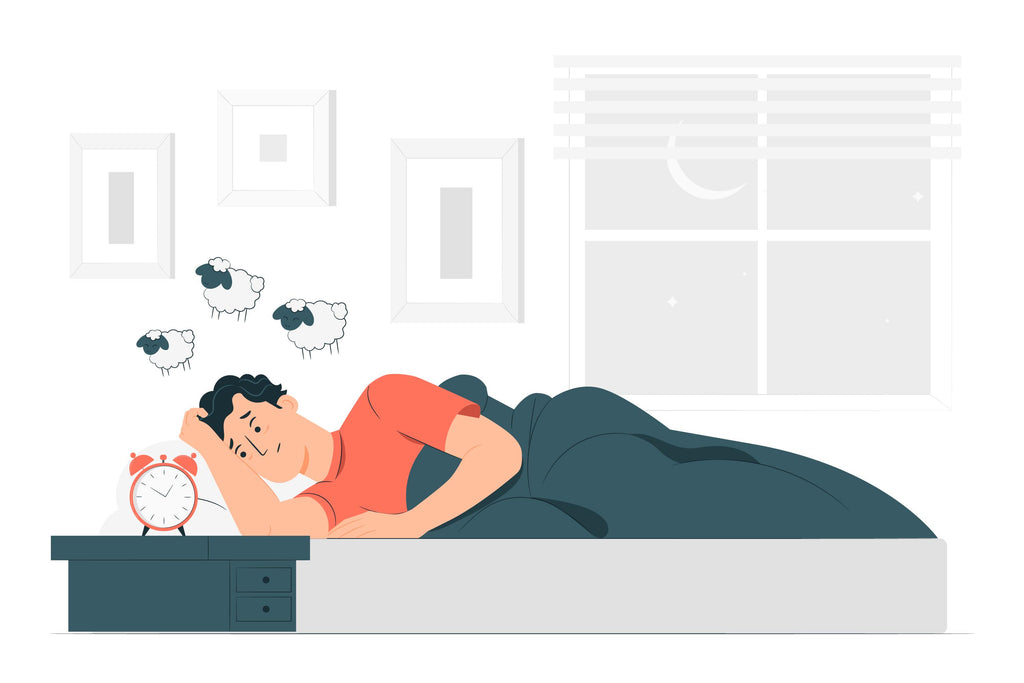What Is Melatonin
In recent years, melatonin has become one of the world’s most popular dietary supplements due to its potential health benefits.
It is a hormone and one of the most important antioxidant molecules. It occurs naturally in the body and is synthesized in the pineal gland in the brain. Its production starts soon after sundown, reaches a peak between 2 and 4 am, and decreases gradually during the final stage of the night.
Melatonin plays many different roles in our body, but it is mostly known for regulating the sleep-wake cycle, reducing the time of falling asleep and overcoming jet lag.

Possible Key Causes of Sleep Problems and Insomnia
- Insufficient exposure to Light during the day.
- Sedentary Lifestyle and Lack of Exercise.
- Low Melatonin and Serotonin Levels.
- Nutritional deficiencies (especially B Vitamins, Magnesium, and Zinc).
- Mood Problems, Irritability, Emotional Stress, Anxiety, Depression.
- Use of popular Stimulants (Caffeine, Black and Green Tea, etc.).
- Hormonal imbalance (low Estrogen, Progesterone, Testosterone).
- Sleeping environment (Noise, Light).
- Certain Medications.
- Obstructive Sleep Apnea.
Main Causes of Melatonin Deficiency
Insufficient level of this hormone is usually the result of the following key factors:
- Deficiency of amino acid tryptophan and hormone serotonin (precursors of melatonin).
- Sedentary lifestyle.
- Insufficient exposure to the sunlight during the day.
- Diet low in amino acid tryptophan.
- Chronic stress.
- Age, as natural production of this hormone declines with age. The older we are the less Melatonin is produced.
Key Health Benefits of Melatonin
- Helps to regulate sleep and reduce the time of falling asleep.
- Supports good mood and helps with feelings of anxiety and depression.
- Helps alleviate jet lag.
- Supports brain function and memory especially in advanced age.
- Promotes healthy immune system.
- Helps maintain normal body temperature.
- Supports hormonal balance and helps maintain regularity of menstruation.
- Supports cardiovascular health may be beneficial for the high blood pressure
Research now shows that Melatonin does not only support natural sleep but offers a range of other health benefits. It helps regulate processes such as temperature, growth and mood and supports cognitive health and immune system function (1).
In addition, Melatonin is a powerful antioxidant that fights free radicals protecting DNA, slowing the ageing process, and helping reduce the risk of developing various health problems including cardiovascular conditions.
Some studies suggest that Melatonin may also have a potent anti-inflammatory property.

Melatonin for Sleep Problems and Low Mood
A good night’s sleep is essential to our mental health, regeneration, immunity, and overall well-being. Unfortunately, many of us have trouble falling asleep and experiencing a restful sleep.
The body’s own production of Melatonin is going down with the natural aging process. That is why supplementation with this important hormone can be a good natural solution for seniors who experience sleep problems.
A research which included the results of 17 studies concluded that compared to a placebo, melatonin supplementation increased the speed with which people fell asleep and improved their sleep quality by a modest. [2].
Due to its mechanism of action – setting the clock for sleep – melatonin could be useful for people suffering from jetlag.
Melatonin as Antioxidant and Cellular DNA support
Research shows that Melatonin has potent antioxidant properties. It seems to be very effective in neutralising dangerous free radicals and it may do it more efficiently than many other antioxidants.
In addition, it also boosts the synthesis of three most important antioxidants, glutathione, superoxide dismutase, and catalase [3].
The cellular DNA damage caused by free radical contributes to the ageing process, infertility, weak immunity, fatigue, and potentially even cancer. Melatonin by helping to protect our cellular DNA against the free radical damage, helps prevent these problems. [4, 5].
Brain Health
Cognitive decline, including poor memory and concentration, is a result of the ageing process. However, it was discovered that the progress of age-related cognitive decline is closely related to the low Melatonin levels in our brains.
This is so because this hormone contributes to the brain’s antioxidant protection by reducing the harmful effect of free radicals [6].
Melatonin and Immune System
Melatonin helps to activate helper T-cells known to regulate the normal responses of other immune cells [7]. Therefore, by activating T-helper cells, this hormone supports healthy function of the human immune system.
Gut Health
Apart from the Pineal gland, Melatonin is also found in large amounts in the gut. According to George Bubenik, concentration of melatonin in the gastrointestinal tract is at least 400 times higher than in the pineal gland [8].
In the gut, melatonin supports the function and regeneration of the lining and reduces the tone of gastrointestinal muscles. It helps prevent irritable bowel syndrome, ulcerative colitis, and colorectal cancer.
In the GI tract it also helps prevent ulcers, benefits the immune system, helps regulation of acidity, digestion, and plays a role in brain signalling.
Melatonin release from the Pineal gland also starts to slow down the function of pancreas as the sun starts setting. Hence, a late-night meal is not digested, metabolized correctly due to mal release of the pancreatic juices and there are high chances of blood sugar levels to spike up the next day due to mal production of insulin.
As it starts getting darker, Melatonin starts signalling the organs to slow down and the process of rest and digest sets in.
Recommended Daily Intake
Adults only, one tablet before bedtime, or before boarding an aircraft for a long flight. Do not exceed recommended daily allowance unless advised by a suitably qualified person.
When to Take Supplemental Melatonin
Melatonin is naturally secreted from the pineal gland at night, and therefore, should be taken at night (1-3 hours before bedtime) for best results.
Other Beneficial Supplements and Herbs for Relaxation and Restful Sleep
Magnesium: Magnesium citrate (high in elemental magnesium), taken one hour before bed, has been shown to relax nervous system and help induce sleep and improve sleep quality.
5-HTP Tryptophan: Research indicates that taking 5-HTP before bedtime can help trigger sleepiness and delay wake times. Amino acid Tryptophan brings on sleep by boosting levels of serotonin, a body chemical that promotes relaxation. Increasing serotonin tryptophan also helps to boost melatonin as it is made of serotonin.
Ashwagandha: Ashwagandha’s Latin name “somnifera” can be translated as “sleep-inducing”. The anti-anxiety effect of Ashwagandha may be also due to the ability of Withanolides to mimic the activity of the calming neurotransmitter gamma-aminobutyric acid (GABA) which reduces overactivity in neurons, acting as a nerve tonic and helping relax, improve mood, reduce anxiety, and promote good sleep.
Lemon Balm and Chamomile are known to support relaxation and calmness.
A good quality Multivitamin-mineral formula such as Healthy Mega (HealthAid), high in B-complex vitamins, taken after breakfast will provide nutrients that are required for the healthy function of the nervous system.
Metcobin (Vitamin B12 in the form of sublingual methylcobalamin) – 1000 mcg under the tongue only after breakfast. It may help induce sleep especially in people over 60 years old as they have problems with absorbing B12 from food due to inability to produce intrinsic factor in the stomach.
Vitamin B12 has been found to help individuals who have problems falling asleep. As a result of taking B12 supplementation, total length of sleep decreased while restorativeness of sleep increased.
In addition, many of those who are B12 deficient never get into deep sleep, although they may have enough of shallow, non-restorative sleep.
However, since Vitamin B12 can boost energy, it should be taken only in the morning.
Also, any other B vitamin, Chlorella, Ginseng, Acetyl L-carnitine, DHEA and many other energy boosting supplements and herbs should be taken only in the morning as they all are known to increase energy and mental alertness.
Related Articles
References
- https://drjockers.com/melatonin/J Endocrinol. 1981 Dec;91(3):467-75.
- Brzezinski, A., Vangel, M. G., Wurtman, R. J., Norrie, G., Zhdanova, I., Ben-Shushan, A., & Ford, I. (2005). Effects of exogenous melatonin on sleep: a meta-analysis. Sleep medicine reviews, 9(1), 41-50.
- J Endocrinol Invest. 2006 Mar;29(3):281-7.
- Eur J Cancer. 1999;35:1688-92.
- J Pineal Res. 2001;30:123-6.
- J Endocrinol Invest. 2006 Mar;29(3):281-7.
- Interdiscip Toxicol. 2008 Sep;1(2):137-49.
- https://pubmed.ncbi.nlm.nih.gov/12395907/J Pineal Res. 2001;30:123-6.
Image by Racool_studio on Freepik Image by storyset on Freepik
Any information or product suggested on this website is not intended to diagnose, treat, cure, or prevent any medical condition. Never disregard medical advice or delay in seeking it because of something you have read on this website. Consult your primary healthcare physician before using any supplements or making any changes to your regime.



